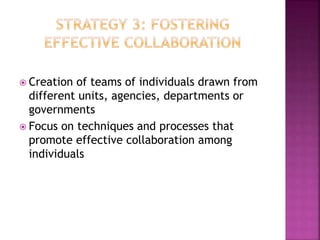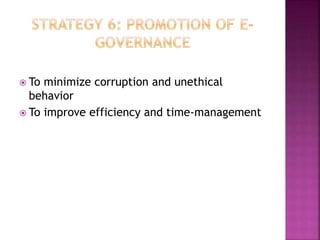Team 1 ppt
- 2. Leadership is one of those qualities that is easier to recognize than define. Leaders are people who do the right thing; managers are people who do things right. Leadership is the ability to influence or inspire others towards achieving leader’s goal A Leader need to create a vision and motivate people towards achieving it.
- 3. Is leadership approach different in Government Agencies or Private Sector enterprise? Yes, it is….
- 4. External or international challenges Internal challenges
- 5. Better Understanding of the variety of developments that are frequently characterized as globalization
- 6. Globalization is the result of: Technological developments New approaches to commerce, trade and finance Rapid dissemination of cultural or political events from one country to another Leaders in Government face above challenges on regular basis.
- 7. Evolution of technology has made citizens aware of what’s happening around Government Officers are continuously being questioned for their actions. Government agencies have tremendous pressure to perform.
- 8. Damage to Nuclear Reactors in Fukushima Plant in 2011 caused lot of hue and cry in Japan. Environmental activists in India protested commissioning of Nuclear Power Plant in Kudankulam, citing Fukushima disaster Government Agencies had tough time to convince people Atomic Energy Regulatory Board had to review the safety provisions from scratch and carry out certain improvements.
- 9. Nations are not alone Many Free Trade Blocs are being formed European Union is economically integrated as one entity Regional cooperation is becoming common National boundaries are permeable Government agencies have to cautiously deal with this sort of situation
- 10. Pressure for more transparent and less corrupt governance Development of democratic institutions Country example – Russia: every year Russia loses up to 33 billion USD due to corruption (according to president D.Medvedev)
- 11. Managing inequality is one of the primary goals of governments The gap between rich and poor is now at its highest level in 30 years in most OECD countries (OECD Report, 2014) Country example – Russia: dissolution of the USSR led to formation of such social groups as oligarchs and poor classes
- 12. The existence of a strong civil society universal access to public infrastructure and facilities equal access to public information Equity in the distribution of wealth and resources Appreciation of cultural diversity Effective leadership Create positive narratives of an inclusive society of the future
- 13. Women Youth Older Persons Persons with Disabilities Indigenous Peoples Migrants Ethnic and Religious Minorities People living with HIV/AIDS
- 14. Inequalities in political power Inequalities within households Differences in legal status and entitlements Gender division of labour within the economy Inequalities in the domestic/unpaid sector Violence against women Discriminatory attitudes
- 15. World map of democratic countries in 2009
- 16. Consequences of democratization Awakening of the population Strong pressure on leaders Various claims and demands Pressing demands for more accountability in the public actions Emergence of national and international pressure groups (associations and NGOs) as Amnesty International, Reporters Without Borders, Transparency International, etc.
- 17. Developing Managerial Effectiveness (time- management, prioritization, strategic thinking, decision-making and getting up to speed with the job) Motivation (the challenge of inspiring or motivating others to ensure they are satisfied with their jobs and working smarter) Developing employees (developing others, including mentoring and coaching) Guiding change (knowing how to mitigate consequences, overcome resistance to change and deal with employees’ reaction to change)
- 18. Managing Internal Stakeholders and Politics (gaining managerial support and managing up and getting buy-in from other departments, groups or individuals) Nepotism
- 20. increasing emphasis upon responsiveness to citizens’ demands government officials to have a better and clearer understanding of exactly what their citizens are seeking or expecting engaging the citizens or a civil society in strategic planning exercises.
- 21. Use case methods, individual and group simulation techniques Don’t use the term “training” for top government officers. Rather use the words such as competency enhancement initiatives, workshops, roundtables, working groups, policy dialogues, etc., as they have much less negative connotations
- 22. For competency enhancement workshops, involve trainers or individuals who have had prior experience at a comparable level of government service. Another critical factor often is the attractiveness of the location in which the activity is being carried out.
- 23. One particularly good strategy is to organize activities around a particular task or policy. Another very good approach, especially for newly elected policy makers, is the creation of orientation sessions or seminars at an early point in their elected terms.
- 24. Most senior level policy makers are reluctant to spend more than a couple of days involved in such activities. So keep the training sessions or workshops for short duration. If a longer time frame is necessary, divide the activity into different segments and spread it over several months.
- 25. Creation of teams of individuals drawn from different units, agencies, departments or governments Focus on techniques and processes that promote effective collaboration among individuals
- 26. If you are effective as a manager then you and your organization will benefit. On the other hand if you are ineffective as a manager, any deficiencies that you have can potentially translate into inefficiencies within your organization. It is therefore important for you to take control of your own development as a manager to ensure that you are able to address your weaknesses in your management skills and build further on your strengths.
- 28. The Seven Principles of Public Life SELFLESSNESS INTEGRITY OBJECTIVITY ACCOUNTABILITY HONESTY LEADERSHIP OPENNESS
- 29. To minimize corruption and unethical behavior To improve efficiency and time-management




























